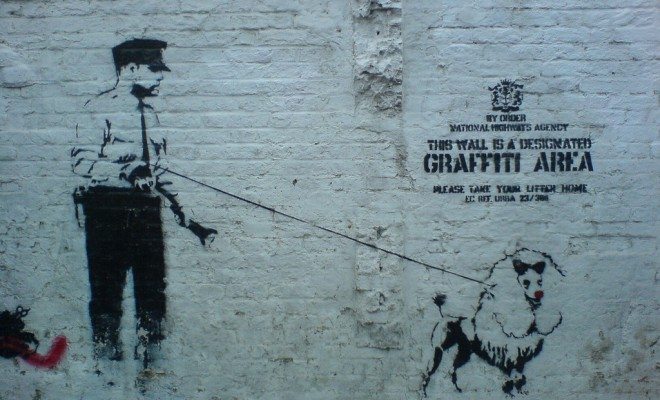 "Banksy" courtesy of [Sean Jackson via Flickr]
"Banksy" courtesy of [Sean Jackson via Flickr]
Weird News
Statistics Meet Art: British Scientists May Have Tracked Down Banksy
Banksy is a famous graffiti artist, political activist, and film director whose “real” identity has never been released. For years, there has been rampant speculation about who exactly Banksy is, but his true name has remained under wraps at least in part because graffiti is still a crime. However, his identity may now be easier to figure out than ever before, thanks to some British criminologists who have tested a new system of “geographic profiling” to help catch serial offenders.
Geographic profiling is not new–in fact you’ve probably seen some early derivations of it on your favorite crime procedural. At its most basic, it can be used to pinpoint origins of all sorts of things, including disease outbreaks. When applied to criminology, it can be used to pinpoint serial offenders, by taking crime scenes and then using mathematical formulas to map where an offender may live or frequent.
Researchers at Queen Mary University of London have been trying to create improved versions of geographic profiling, and in order to test their new system, inputted incidences of Banksy’s graffiti in both London and Bristol. The formula spit back the name Robin Gunningham, which shouldn’t really surprise Banksy fans because Gunningham’s name has come up as a Banksy suspect before. The researchers published these findings in the Journal of Spatial Science. However, they were clear to point out that they didn’t think that their method was going to work as well as it did. Steve Le Comber, one of the authors of the study, stated:
What I thought I would do is pull out the 10 most likely suspects, evaluate all of them and not name any… But it rapidly became apparent that there is only one serious suspect, and everyone knows who it is.
As with almost any application of academia, there have been criticisms of the study, including the fact that the researchers didn’t include some outliers, and that because Banksy’s work is anonymous, they could have unknowingly included copycats. And Le Comber and the other researchers are careful to say that Banksy is not definitely Gunningham, but just that their research offers additional support for the theory.
After the findings of the study became known, Bansky’s legal team contacted the researchers, apparently taking some issue with a press release that was going to accompany the study’s journalistic publication. That press release has since been yanked. The paper itself, which apparently Banksy’s legal team did not take issue with, was published Thursday.
The researchers’ findings certainly don’t prove anything definitively about who Bansky actually is–but the fact that they match up with a man who has been accused of being Banksy before isn’t a coincidence. This look into Banksy’s identity was certainly an interesting application of geographic profiling, but if this kind of technology works it could have a huge impact on tracking serial offenders of much more vicious crimes.








Comments